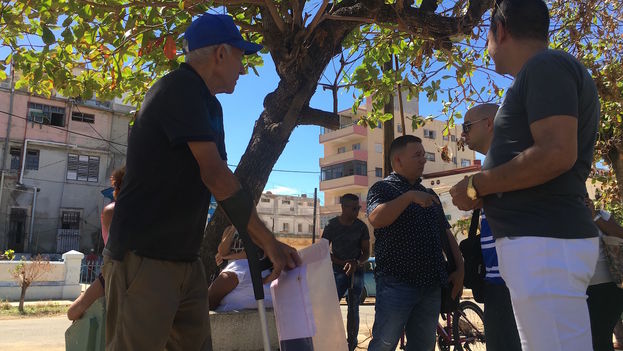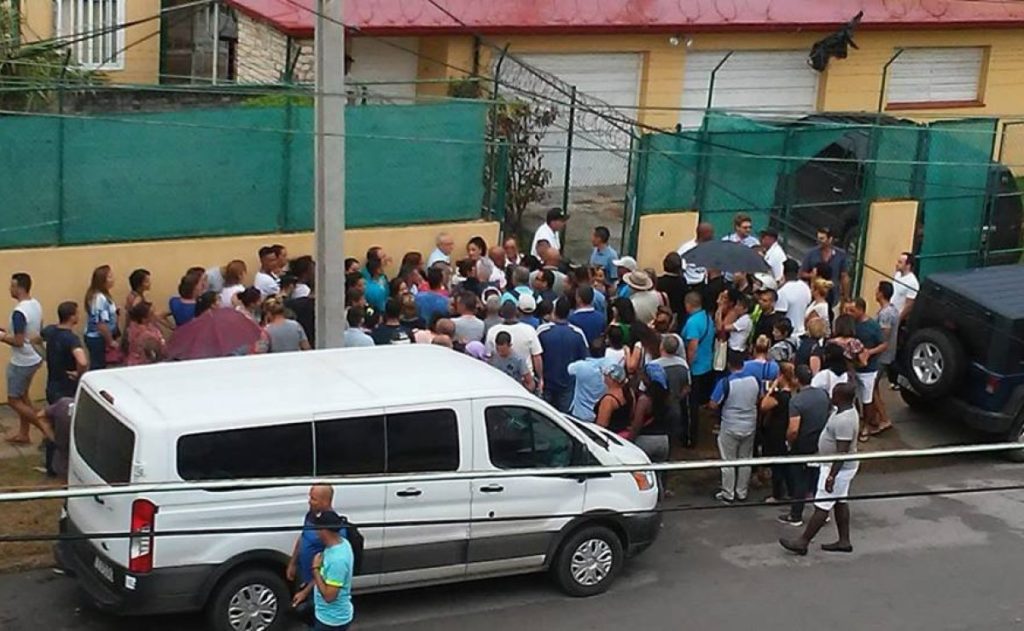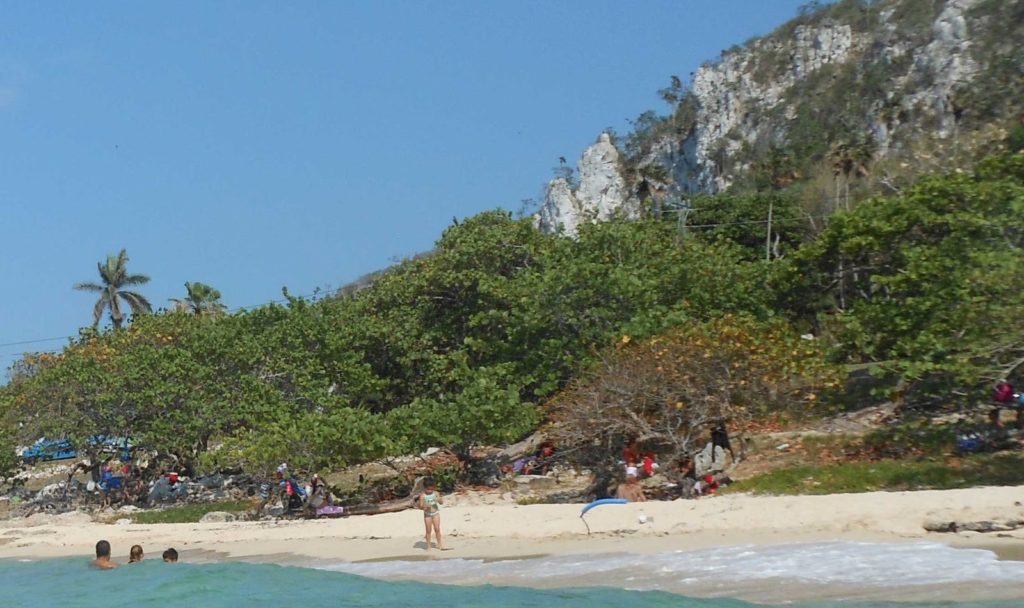La suspensión de visados para EE UU hunde en la desesperación a miles de cubanos. Desde todas partes de la Isla miles de personas intentan averiguar qué ocurrirá con las entrevistas consulares que tenían planificadas.
Comunicar con el teléfono de la embajada de Estados Unidos en La Habana se ha convertido en una tarea imposible. Desde todas partes de la Isla miles de personas intentan averiguar qué ocurrirá con las entrevistas consulares que tenían planificadas antes de la suspensión indefinida de la emisión de visados para ese país.
María Encarnación, Caruca, deshoja la margarita de la desesperanza desde que su hija la llamó para darle la noticia. “Me subió la presión porque tenía mi cita consular programada para octubre y ahora nadie sabe darme una explicación”, cuenta esta jubilada de 67 años a 14ymedio.
Tras varias horas de intentos, Caruca logró hablar con una empleada del consulado de EE UU, que añadió aún más desazón a su estado de ánimo. “Todas las operaciones están canceladas hasta nuevo aviso”, le advirtió la voz al otro lado de la línea telefónica. “Esto puede solucionarse en una semana o pueden pasar años, no sabemos”, remachó.
Durante el año fiscal 2016, Estados Unidos aprobó las solicitudes de visado de 14.291 cubanos, que realizaron visitas familiares, de negocio, participaron en programas de intercambios o hicieron presentaciones culturales y deportivas.
La cancelación de la actividad consular devuelve al imponente inmueble de la Embajada a una condición similar a la que tenía antes de 1977, cuando un acuerdo entre Fidel Castro y Jimmy Carter le permitió funcionar como Sección de Intereses de Estados Unidos en La Habana. Desde entonces, decenas de miles de personas han solicitado visas en sus ventanillas.

Personas mayores llegaban en busca de noticias a la embajada. (14ymedio)
Personas mayores llegaban en busca de noticias a la embajada. (14ymedio)
Durante el año fiscal 2016, Estados Unidos aprobó las solicitudes de visado de 14.291 cubanos, que realizaron visitas familiares, de negocio, participaron en programas de intercambios o hicieron presentaciones culturales y deportivas, entre otras categorías. Una cifra bastante menor a las 22.797 visas que se otorgaron en igual período de 2015 y de las 41.001 entregadas en 2014.
Una portavoz del Departamento de Estado explica la drástica reducción como efecto de “la extensión, de seis meses a cinco años, del tiempo de validez de la visa B2 para nacionales cubanos”. Sin embargo, desde que en enero pasado Barack Obama eliminó la política de pies secos/ pies mojados, muchos temían que la restricción en los visados inminente.
“Por poco caigo redonda cuando oí lo que me dijeron por teléfono. Entonces fue que decidí venir para La Habana porque llevo semanas pensando que algo así iba a pasar”, explica Caruca. Pidió dinero prestado, alquiló un vehículo particular desde Los Palacios, en Pinar del Río, donde vive con su esposo y el hijo que le queda en Cuba, para llegar a la capital lo antes posible.
“Amanecí afuera de la Embajada a esperar que salga alguien y dé la cara”, contaba este lunes en el pequeño parque donde se congregaron durante años los solicitantes de visado. El lugar, todavía con las huellas de los destrozos que dejó el huracán Irma, no es ya aquella zona donde se juntaban la esperanza y los consejos “para salir bien en la entrevista”.
“Amanecí afuera de la Embajada a esperar que salga alguien y dé la cara”, contaba este lunes en el pequeño parque donde se congregaron durante años los solicitantes de visado.
Ahora, los que esperan tienen la mirada angustiada, la voz entrecortada y sus móviles suenan todo el tiempo con llamadas desde Miami, Nueva York o Houston. “¿Qué tu quieres que yo haga mi´ja, si no se puede, no se puede”, hablaba a gritos por el celular un hombre que aseguró haber viajado desde Jatibonico, en Ciego de Ávila.
“Dice que tenemos que revisar la página web de la embajada, que ahí va a salir toda la información”, dice subiendo aún más el volumen de voz. El sol pica y algunos se cobijan bajo la sombra de los árboles, otros se quitan los zapatos al sentarse en los bancos. “Esto va para rato así que mejor ponerse cómodo”, advierte.
Pasadas las once de la mañana, una funcionaria cubana sale de la sede consular estadounidense y es rodeada por gente ansiosa por saber. “Todas la entrevistas están canceladas”, repite con énfasis. Un hombre quiere explicar que su caso es urgente, porque su hermano está ingresado en hospital de Texas y quizás es su última posibilidad de decirle adiós.
La cancelación de las entrevistas pone en riesgo que se cumpla el número de visados que la sección consular debe entregar cada año en la Isla. Según los acuerdos migratorios firmados entre ambos países en 1994 y 1995, EE UU debe estampar 20.000 visas anuales de inmigrante a solicitantes cubanos.
“¿Ustedes no escuchan?”, repite molesta la empleada. La frase le dispara la presión a Caruca, hace sudar a los más ecuánimes del grupo y le quiebra la voz a una mujer que solo atina a decir: “No, esto no puede ser así, tiene que haber un error”.
Una señora, que ha llegado desde el municipio Marianao y tenía la entrevista programada justo para la tarde de este lunes, reclama: “Quiero saber si me van a devolver el dinero”, reclamaba el pago de la cita que su familia había abonado en Estados Unidos, pero la funcionaria no tiene respuestas y vuelve a recomendar que se consulte la web.
Para los negocios de los alrededores la noticia ha sido un mazazo. “De la noche a la mañana nos hemos quedado sin trabajo”, asegura Diosdado, que ayuda, con su mujer y su hija, a rellenar los complejos formularios de solicitud de visado. “Esta casa no paraba, era un cliente tras otro y ahora no viene nadie”, protesta mientras muestra el local vacío.
Algunas familias de la zona también subsistían alquilando habitaciones para los solicitantes de visado. Siguen llegando algunos clientes que vienen a averiguar la situación de sus solicitudes de visa, explica el dueño de una casa con dos habitaciones de alquiler, pero “pronto no vendrá nadie”.
Otros han aprovechado la estampida estadounidense para mejorar en muebles, electrodomésticos y comida. Los funcionarios que vuelven a su país han hecho ventas de garaje en sus casas, difundidas por correo entre empleados cubanos de la sede diplomática, amigos y conocidos, ofreciendo todo tipo de mercancías.
“Me compré un taladro y una nevera”, cuenta a este diario un empleado de mantenimiento que se enteró de una de las ventas en una casona de Miramar. “También logré comprar unas sillas para el comedor y una lámpara de baterías para cuando no tenga electricidad”. A pesar de que todo lo consiguió a buen precio, el hombre lamenta que ahora se quedará sin trabajo.
Ahora, el edificio donde trabajó por más de una década se ha ido vaciando lentamente. “Antes del anuncio del viernes ya se habían ido muchos funcionarios y esta semana la estampida será grande”, asegura. “El consulado es una de las áreas con más reducción y muy pocos quieren quedarse hasta que no se aclare todo lo que pasó”.
“Trabajar con los ‘yumas’ era bueno porque son muy respetuosos, regalan muchas cosas y además las condiciones de trabajo eran excelentes”
El Gobierno cubano asegura que no tiene ninguna relación con el ataque acústico sufrido por 21 diplomáticos norteamericanos. En los medios oficialistas el tema tema se ha manejado como algo de menor importancia, aunque en las calles no se habla de otra cosa.
Un vendedor de café se acerca al parque a pocos metros de la Embajada y ofrece su mercancía en pequeños vasitos de plástico. “Por el momento sigo vendiendo porque está llegando mucha gente a averiguar por su entrevista, pero no sé cuánto me va a durar esto”. A pocos metros, los policías cubanos que custodian la sede diplomática parecen más tensos de lo normal.
“Tienen miedo de que esto se vaya a llenar de gente reclamando y protestando”, asegura el vendedor de café. “No hay nada que moleste más a un cubano que se le tronche un viaje”, opina. “Los cubanos pueden pasar necesidades callados, perder la casa en un huracán y seguir callados, pero cuando se trata de una visa gritan cantidad”, reflexiona.
Un mujer de 60 años pide dos cafés. Los toma de un tirón y cuenta que ha viajado durante 14 horas desde Manzanillo, en la provincia de Granma. Tenía este lunes la entrevista para un visado de residencia por reunificación con su hijo. Los planes se le han hecho pedazos y su hijo le insiste por teléfono que se acerque a la Embajada. “No dejan, no puedo”, responde en un sollozo.
La tarde cae y algunos se aprestan a quedarse hasta recibir una respuesta. La gente en el parque, una vez envidiada por estar cerca de un viaje al extranjero, ahora son un manojo de frustraciones y miedos.
CUBA REPORTER: DESPAIR AND UNCERTAINTY IN CUBA BY THE SUSPENSION OF VISAS TO THE UNITED STATES .
US visa suspension plunges thousands of Cubans into despair. Thousands of people are trying to figure out what will happen to the planned consular interviews.
Communicating with the telephone of the US embassy in Havana has become an impossible task. From all parts of the island thousands of people try to find out what will happen to the consular interviews they had planned before the indefinite suspension of visa issuance for that country.
María Encarnación, Caruca, stripped the daisy of hopelessness since her daughter called her to give her the news. “I got the pressure because I had my consular appointment scheduled for October and now no one knows how to give me an explanation,” says this retired 67-year-old middle age.
After several hours of attempts, Caruca managed to speak with an employee of the US consulate, which added still more discomfort to his state of mind. “All operations are canceled until further notice,” the voice warned on the other side of the phone line. “This can be solved in a week or it can happen years, we do not know”, riveted.
During fiscal year 2016, the United States approved visa applications for 14,291 Cubans, who made family or business visits, participated in exchange programs or made cultural and sports presentations.
The cancellation of the consular activity returns the imposing building of the Embassy to a condition similar to that it had before 1977, when an agreement between Fidel Castro and Jimmy Carter allowed it to function as a US Interests Section in Havana. Since then, tens of thousands of people have applied for visas in their windows.
During fiscal year 2016, the United States approved visa applications for 14,291 Cubans, who made family, business, exchange or cultural and sports presentations, among other categories. A much lower figure than the 22,797 visas granted in the same period of 2015 and 41,001 in 2014.
A spokeswoman for the State Department explains the drastic reduction as an effect of “the extension, from six months to five years, of the validity of the B2 visa for Cuban nationals.” However, since last January Barack Obama eliminated the policy of dry feet / wet feet, many feared the visa restriction imminent.
“I almost fell round when I heard what they told me on the phone. So I decided to come to Havana because I’ve been thinking that something like that would happen,” explains Caruca. She borrowed money, rented a private car from Los Palacios, in Pinar del Rio, where she lives with her husband and her son in Cuba, to get to the capital as soon as possible.
“I got up outside the embassy to wait for someone to come out and show my face,” he said Monday in the small park where visa applicants have congregated for years. The place, still with the traces of the wreckage left by Hurricane Irma, is no longer that area where hope and advice were gathered “to succeed in the interview.”
“I got up outside the embassy to wait for someone to come out and show my face,” he said Monday in the small park where visa applicants have congregated for years.
Now, those who wait have the distressed look, the choppy voice and their mobiles ring all the time with calls from Miami, New York or Houston. “What do you want me to do mi’ja, if you can not, you can not,” a man who claimed to have traveled from Jatibonico, in Ciego de Avila, shouted on the cell phone.
“It says that we have to check the website of the embassy, that there will be all the information,” he says, raising the voice volume even more. The sun bites and some shelter under the shade of the trees, others take their shoes off when sitting on benches. “This is going to be a while so better get comfortable,” he warns.
After eleven o’clock in the morning, a Cuban official leaves the US consulate and is surrounded by people anxious to know. “All the interviews are canceled,” he repeated emphatically. A man wants to explain that his case is urgent, because his brother is admitted to a Texas hospital and is perhaps his last chance to say goodbye.
The cancellation of the interviews puts at risk the number of visas that the consular section must deliver each year in the Island. According to the migratory agreements signed between both countries in 1994 and 1995, the US must stamp 20,000 annual immigrant visas a Cuban applicants.
“Do not you guys listen?” The maid repeats. The phrase shoots the pressure on Caruca, makes the most equanimous of the group sweat and breaks the voice to a woman who only tries to say: “No, this can not be like this, there has to be a mistake.”
One woman, who has arrived from Marianao municipality and had the interview scheduled for Monday afternoon, claims: “I want to know if they are going to give me back the money”, demanded the payment of the appointment that their family had paid in the States United, but the official has no answers and recommends again to consult the web.
For the surrounding businesses the news has been a blow. “We have been out of work overnight,” says Diosdado, who helps with his wife and daughter fill out the complex visa application forms. “This house did not stop, it was one customer after another and now nobody is coming,” he protests as he shows the empty room.
Some families in the area also subsisted renting rooms for visa applicants. They continue to arrive some clients who come to find out the status of their visa applications, explains the owner of a house with two rooms for rent, but “soon no one will come.”
Others have taken advantage of the American stampede to improve on furniture, appliances and food. Officials returning to their country have made garage sales in their homes, spread by mail between Cuban employees of the diplomatic headquarters, friends and acquaintances, offering all kinds of goods.
“I bought a drill and a refrigerator,” tells a daily maintenance employee who learned of one of the sales in a mansion of Miramar. “I also managed to buy some chairs for the dining room and a battery lamp for when I do not have electricity.” Although everything was achieved at a good price, the man regrets that now he will be out of work.
Now, the building where he worked for more than a decade has slowly been drained. “Before the announcement on Friday many officials had already gone and this week the stampede will be great,” he says. “The consulate is one of the areas with the most reduction and very few want to stay until everything is clear.”
“Working with the ‘yumas’ was good because they are very respectful, they give away many things and also the conditions of work were excellent”
The Cuban government says it has nothing to do with the acoustic attack suffered by 21 US diplomats. In the official media the issue has been handled as something of less importance, although in the streets do not speak of anything else.
A coffee vendor approaches the park a few meters from the Embassy and offers its merchandise in small plastic cups. “For the moment I keep selling because a lot of people are coming to find out about your interview, but I do not know how long this will last.” A few meters away, the Cuban policemen who guard the diplomatic headquarters seem more tense than normal.
“They are afraid that this will fill up with people complaining and protesting,” says the coffee vendor. “There is nothing that annoys a Cuban more than a trip breaks,” he says. “Cubans can pass on quiet needs, lose their home in a hurricane and remain silent, but when it comes to a visa, they shout,” he reflects.
A woman of 60 asks for two coffees. He takes them with a tug and tells that he has traveled for 14 hours from Manzanillo, in the province of Granma. He had the interview Monday for a residence visa for reunification with his son. Plans have been broken and his son insists on the phone to approach the Embassy. “They do not leave, I can not,” he answers in a sob.
The afternoon falls and some are ready to stay until they receive a response. The people in the park, once envied for being close to a trip abroad, are now a bundle of frustrations and fears.
Agencies/14ymedio/Zunilda Mata, La Havana/Internet Photos/ Arnoldo Varona/ TheCubanHistory.com
THE CUBAN HISTORY, HOLLYWOOD.










